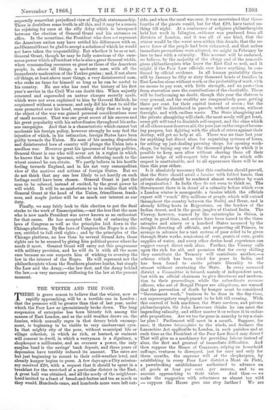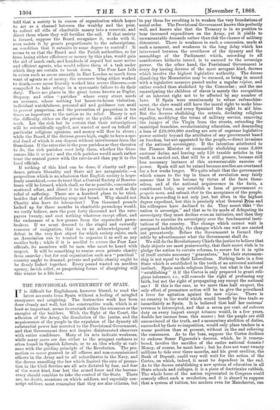THE WINTER AND THE POOR.
THERE is grave reason to believe that the winter, now so rapidly approaching, will be a terrible one in London ; that the pressure will be greater than that of last year, under which the Poor Law so ignominiously broke down. The long suspension of enterprise has been bitterly felt among the masses of East London, and as the cold weather draws on, the famine, which annually rages in that dreary brick encamp- ment, is beginning to be visible to very unobservant eyes. In that mighty city of the poor, without municipal life or village cohesion, in which no rich, or learned, or eminent will consent to dwell, in which a vestryman is a dignitary, a shopkeeper a millionaire, and an overseer a power, the only surplus fund is the savings' bank deposit, and three years of depression have terribly reduced its amount. The rates are but just beginning to mount to their cold-weather level, and already hunger begins to press. A few days ago a City mission- ary received E20, with a request that it should be spent in a breakfast for the wretched of a particular district in the East. A great hall was obtained, and all the needy of the neighbour- hood invited to a feast of bread-and-butter and tea as much as they would. Hundreds came, and hundreds more were left out- side, and when the meal was over, it was ascertained that three- fourths of the guests would, but for that £20, have tasted no- thing till night. At a conference of religious philanthropists held last week in Islington, evidence was produced from all districts of London, and it was all of one kind, that the winter would be the worst seen within this decade, that the re- serve force of the people had been exhausted, and that unless immediate precautions were adopted, we might in February be face to face with a calamity. This account will be endorsed, we believe, by the majority of the clergy and of the non-reli- gious philanthropists who know the East End so well, and it might, if the Poor Law officials ever knew anything, be con- firmed by official evidence. In all human probability there will by January be fifty or sixty thousand heads of families in East London alone without work, or the probability of work, with no means to pay rent, with little strength, and no protection from starvation save the contributions of the charitable. These will be forthcoming no doubt, though this year the distress is very general, and the wealthy are comparatively poor, getting three per cent. for their capital instead of seven ; but the money will be distributed in parcels, without system, without foresight, and with endless waste. The State almsgiving and the private almsgiving will clash, the most needy will get least, every gift will tend to diminish self-respect, and the class which of all others most deserves aid, the poorjust on the verge of becom- ing paupers, but fighting with the pluck of otters against their destiny, will get no help at all. There was no time last year for anything but direct alms, for organizing systems of loans, for setting up just-dealing pawning shops, for opening work- shops, for trying any one of the thousand plans by which it is possible to keep men alive without shoving them off their narrow ledge of self-respect into the abyss in which self- respect is unattainable, and to all appearance there will be no time this year either.
Is it absolutely necessary that this confusion should prevail, that the State should await a famine with folded hands, that private charity should be rendered almost worthless by want of organization ? In India they do not seem to think so. The Government there is in dread of a calamity before which even a London winter is manageable, a famine which the officials expect will "reach" fifty millions of people, which will extend throughout the country between the Sutlej and Berar, and is already killing hosts in Rajpootana, on the borders of the Indian desert, and in the great jungles of Central India. The Viceroy, however, warned by the catastrophe in Orissa, is acting in good time, and orders have been issued to the three satrapies and ninety or a hundred States menaced by the drought directing all officials, and requesting all Princes, to arrange in advance for a vast system of poor relief to be given through State works, remissions of rent, grants of corn, gratis supplies of water, and every other device local experience can suggest except direct cash alms. Further, the Viceroy calls upon the rich for aid, and promises that for every shilling they contribute the Treasury will contribute another,—a scheme which has been tried for years in India, and has been found to excite private liberality to the utmost without overtaxing the State. In every menaced district a Committee is formed, mainly of independent men, but with an official chairman to give directness and modera- tion to their proceedings, while the subordinate revenue officers, who out of Bengal Proper are ubiquitous, are warned that the prevention of death by hunger must be considered "Government work," business to bo done in the day-time, not supererogatory employment to be left till evening. With this control of both machines, the State services, and private philanthropists, Sir John Lawrence thinks he can meet the impending calamity, and either master it or reduce it to endur- able proportions. Are we too far gone in anarchy to try a simi- lar plan ? Parliament will meet in a month. Suppose, for once, it throws laissez-faire to the winds, and declares the Lancashire Act applicable to London, in such parishes and at such time as the President of the Poor Law Board may direct ? That will give us a machinery for providing labour instead of alms, the first and greatest of immediate difficulties. And then suppose the House of Commons, relying on household suffrage, ventures to disregard, just for once and only for three months, the supreme will of the shopkeepers, by establishing in every Poor Law district a Mont de Piete, a pawnbroking establishment authorized to advance on all goods at four per cent. per annum, and to an
amount approaching to their value. And then — we make the suggestion with reluctance as almost too wild
— suppose the House goes one step farther We are told that a society is in course of organization which hopes to act as a channel between the wealthy and the poor, to collect all rills of charitable money into a reservoir, and direct them where they will fertilize the soil. If that society is formed, suppose the Board recognizes it, works with it, even assists it by grants proportionate to the subscriptions, on condition that it submits in some degree to control ? It seems to us that the Board and the Parish authorities, so far from losing either efficiency or money by this plan, would gain the aid of much cash, and hundreds of unpaid but most active and efficient agents, who would relieve them of a task under which they are certain to break down. The Poor Law fails in crises such as occur annually in East London as much from want of agents as of money, the overseers being either worked to death,—we mean literally worked into severe illnesses,—or compelled to take refuge in a systematic failure to do their duty. There are places in the great towns known as Poplar, Stepney, and other " parishes " where every street needs an overseer, where nothing but house-to-house visitation, individual watchfulness, personal aid and guidance can avail to prevent pauperism, and the prevention of pauperism is ten times as important to the nation as its relief. Money is not the difficulty, either on the private or the public side of the work. Let the rich but be certain that their subscriptions will be scientifically applied, not wasted or used on behalf of particular religious opinions, and money will flow in rivers ; while the Board, if the distress grows high, ought to have a spe- cial fund of which it can dispose without interference from the Guardians. If the rates rise in the poor parishes as they threaten to do, the rich parishes must help them, whether the Gros- venors like it or not ; and the rich parishes would much rather trust the central power with the rate-in-aid than pay it to the local officials.
If nothing of this kind can be done, if charity and pru- dence, private liberality and State aid are antagonistic,—a proposition which is an admission that English society is hope- lessly anarchical,—we do trust that a Central Society of Benevo- lence will be formed, which shall, so far as possible, concentrate scattered effort, and direct it to the prevention as well as the relief of suffering. There are a hundred plans to be tried, besides that of distributing soup and bread. Why should not Charity also have its labour-test ? Ten thousand pounds locked up for three months in charitable pawnshops would, we verily believe, save the poor forty thousand and the rate- payers twenty, and cost nothing whatever except effort, and the endurance of a few groans from the superseded pawn- brokers. If we must descend to the stupid and cowardly resource of emigration, that is, to an acknowledgment of defeat in the very first object for which society exists, such an Association can be trusted to organize it as well as any smaller body ; while if it is needful to coerce the Poor Law officials, its members will be men who must be heard with respect. It will be something to rescue even private charity from anarchy ; but for real organization such as a " practical " country ought to demand, private and public charity ought to be firmly linked together. Every pound wasted on needless agency, lavish relief, or pauperizing forms of almsgiving will this winter be a life lost.































 Previous page
Previous page